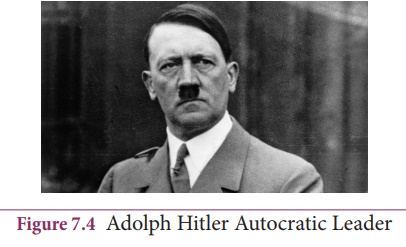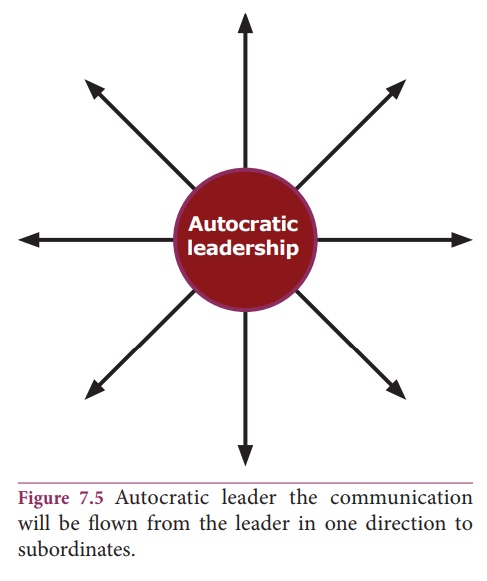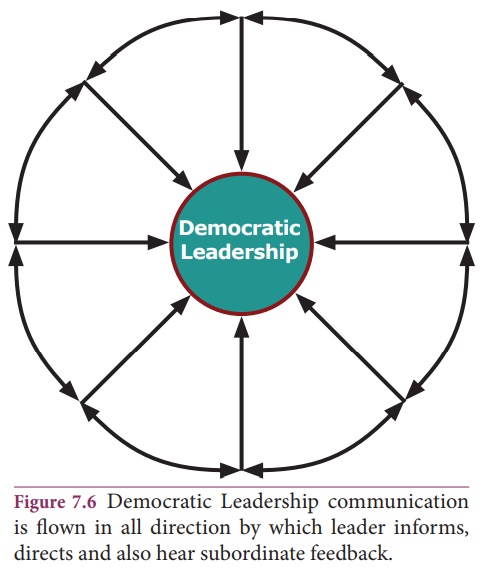Advantages, Disadvantages - Kinds of Leadership Styles | 12th Office Management and Secretaryship : Chapter 7 : Leadership and Communication
Chapter: 12th Office Management and Secretaryship : Chapter 7 : Leadership and Communication
Kinds of Leadership Styles
Kinds of Leadership Styles
A Leadership
style denotes a specific behaviour a person exhibits in order to influence
people and achieve organisational objectives. Each style has a peculiar
feature.
They are
Autocratic or Authoritarian Leadership:
Autocratic or Authoritarian Leadership: An
autocratic leader exercises complete
control over the subordinates. He centralises power in himself and takes all
decisions without consulting the subordinates. He dominates and drives his
group through pressure or force. The leader gives orders and expects the
subordinates to follow them without questioning. He uses rewards and holds
threat of penalties to direct the subordinates. Autocratic leadership style may
be appropriate when subordinates are uneducated, unskilled and submissive.
Advantages
·
Autocratic leadership style
permits quick decision
making
·
It gives strong motivation and satisfaction to the leader who dictates
terms.
·
Less competent subordinates are needed at lower level.
·
This style may yield positive
results in prompt
situation.

Disadvantages
·
Autocratic style leads to
frustration, low morale and
conflict among subordinates.
·
Full potential of subordinates and their creative ideas are not utilized.
· Organisational continuity is threatened in the absence of the leader because a subordinate gets no opportunity for development.
Democratic or Participative Leadership
A consultative
or democratic takes decision in consultation and participate with the
subordinates. He decentralises authority and allows the subordinates to share
his power. The leader does what the group wants and follows the majority
opinion. He keeps the followers informed about matters affecting them. A
democratic leader provides freedom of thinking and expression. He listens the
suggestion, grievances and opinions of the subordinates.
Advantages
·
Consultative leadership improves the job satisfaction and morale of
subordinates.
·
It cultivates the decision making ability of subordinates.
·
The leader multiplies his ability through the contribution of his followers.
·
It develops positive attitude of
the leader and
reduces resistance to change.
·
The quality of decisions is
improved.
·
Labour absenteeism and Labour turnover is reduced.
Disadvantages
·
Democratic style is time-consuming and may result in delays in decision-making.
·
It may not yield positive results when subordinates prefer minimum interaction
with the leader.

·
Over a period of time subordinates may develop the habit of expecting to be
consulted.
Free-Rein or Laissez Fair Leadership
Free –rein
leadership involves complete delegation of authority so that subordinates
themselves, can take decisions. A free rein leader avoids power and
relinquishes the leadership position. He serves only as a contact/medium to
bring the information and resources needed by the subordinates. Free rein style
may be appropriate when the subordinates are well trained, highly knowledgeable;
self motivated and ready to assume responsibility.

Advantages
·
Positive effect on job
satisfaction and morale of
subordinates
·
Maximum possible scope for
development of subordinates
·
Full utilization of the potential
of subordinates
Disadvantage
·
Subordinates do not get the
guidance and support of
the leader.
·
Subordinates may in different
directions and may work
at cross purposes which may degenerate in to chaos.
Functional Leadership
A functional
leader is one who is an expert in a particular field of activity. He has
reached to the position of a leader by virtue of certain special skills that he
possesses. Such a leader always thinks of the task he has undertaken and spends
most of his time finding out ways and means of doing it better.
Advantages
·
The presence of an expert or a functional leader is beneficial to the
followers and the organisation.
·
As the functional leader is a
specialist in a
particular field of activity, the subordinates can certainly enrich their job
knowledge and skill, provided they are as committed and sincere as their leader
is.
Disadvantages
·
The functional leader concentrates
on his work only.
An efficient subordinate can only work with him.
·
Functional leader cannot go down to the level of an average worker and offer
any help.
Institutional Leader
An
Institutional leader is one who has become a leader by virtue of his official
position in the organisational hierarchy. For Ex: A person appointed as a
general manager of the company. An institutional leader may not provide expert
guidance to his followers. But he has to secure performance from them.
Advantages
·
He has official authority to act.
·
He can demand performance from subordinates irrespective of his own
credentials and the subordinates are officially answerable to him.
Disadvantages
·
As the institutional leader may
not be an expert in
his field of activity, he will not be in a position to offer proper guidance to
his followers.
·
Although the leader has the
official right to
demand performance from his followers, he may not have the moral right, as his
own credentials are less.
Paternalistic Leader
A
Paternalistic leader takes care of his followers in the way the head of the
family takes care of the family members. He is mainly concerned with the well
being of his followers and is always ready to protect them. He may provide them
with all the physical amenities needed. But he will not be able to guide them
to perform the job well. Thus, the paternalistic leader is able to be sociable
but is not able to offer intellectual help.
Advantage
·
He assumes a paternal role to
protect his followers.
·
He is always ready to provide the necessary physical amenities to the
subordinates.
Disadvantage
·
He is not in a position to offer intellectual help to his followers.
·
Those followers, who are capable
and achievement
-oriented, feel frustrated as the leader is not able to guide them to enrich
their job knowledge and skill.
Charismatic Leader
Charismatic
leadership is basically the method of encouraging particular behaviors in
others by way of effective communication, persuasion and force of personality.
Charismatic leaders motivate followers to get things done or improve the way
certain things are done. This is accomplished by stimulating up eagerness in
others to achieve a stated goal or vision. In essence, the charismatic
leadership style has its basis in a form of heroism.
This
leadership style is almost of divine origin which means by their birth itself
they have some quality (Traits) Character which makes others to admire them.
Advantages
·
They naturally command leadership from their quality, so no formal rules and
authority are needed.
·
Their presence itself gives energy
and motivation to
the followers.
Disadvantages
·
These types of Leaders are very
few in number to
identify.
·
In an organisational set up leadership with formal authority can be more effective.
Related Topics